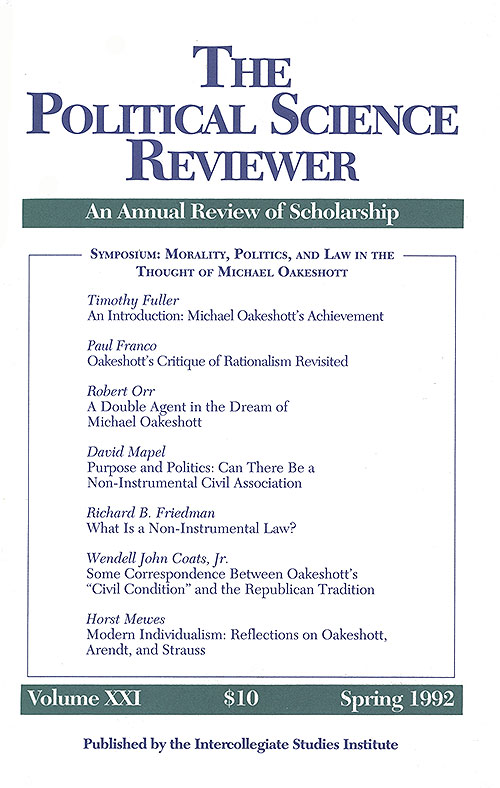How to Cite
Some Correspondence Between Oakeshott’s “Civil Condition” and the Republican Tradition. (1992). The Political Science Reviewer, 21, 99-115. https://politicalsciencereviewer.wisc.edu/index.php/psr/article/view/295
Abstract
Abstract previews are not available for Volume 29 and earlier. Please view the PDF of this article.Most read articles by the same author(s)
- Alexander J Groth, Demonizing the Germans , The Political Science Reviewer: Vol. 32 (2003): A Symposium on Bertrand de Jouvenel
- Douglas Walker, Michael Giles, Tocqueville Reconsidered: On Secular Morality and Religion’s Place in Liberal Democracy , The Political Science Reviewer: Vol. 43 No. 1 (2019): Essays
- Richard M Gamble, The United States as World Savior , The Political Science Reviewer: Vol. 38 (2009): A Symposium on Rémi Brague’s <em>The Law of God: The Philosophical History of an Idea</em>
- Robert Anthony Waters, How Socialism Underdeveloped Africa , The Political Science Reviewer: Vol. 34 (2005): Eric Voegelin’s <em>New Science of Politics</em>: A 50th Anniversary Symposium
- Michael Federici, The Politics of Prescription , The Political Science Reviewer: Vol. 35 (2006): Symposia on Edmund Burke and on Russell Kirk’s <em>The Conservative Mind</em>
- Mark G Malvasi, Kirk among the Historians , The Political Science Reviewer: Vol. 35 (2006): Symposia on Edmund Burke and on Russell Kirk’s <em>The Conservative Mind</em>
- Glenn A Moots, The Bible, the Founders, and Christian America , The Political Science Reviewer: Vol. 41 No. 2 (2017): Symposium: The Life and Work of Christopher Dawson
- Sonu Bedi, Review of Mere Civility: Disagreement and the Limits of Toleration , The Political Science Reviewer: Vol. 42 No. 2 (2018): Symposium: The Political Thought of Robert Nisbet
- Lee Trepanier, Culture and History in Eric Voegelin and Christopher Dawson , The Political Science Reviewer: Vol. 41 No. 2 (2017): Symposium: The Life and Work of Christopher Dawson
- Grant Havers, Was Spinoza a Liberal? , The Political Science Reviewer: Vol. 36 (2007): A Symposium on Leo Strauss and His Students
